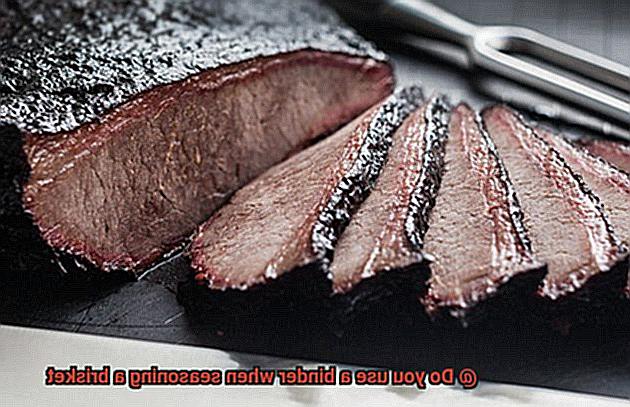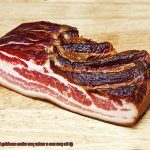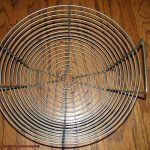Are you a barbecue fanatic, obsessed with achieving brisket perfection?
Well, my friend, you’ve stumbled upon the holy grail of all things brisket seasoning. Today, we’re about to embark on a fiery journey into the world of binders.
Wait, what’s a binder, you ask? Don’t fret, my famished comrades, I’ve got your back.
A binder is like the fairy godmother of flavor – it’s that magical ingredient that makes your spices cling to the surface of the brisket like velcro. It’s the secret weapon that elevates your taste buds to cloud nine.
So grab your apron, crank up that smoker, and let’s unravel the enigma behind using a binder to conquer brisket seasoning like a boss.
Contents
What is a Binder?
Grilling the perfect brisket requires a delicate balance of flavor and tenderness. One secret weapon that can take your brisket to new heights is a binder.
In this blog post, we will delve into the world of binders, understanding what they are, their purpose in seasoning a brisket, and explore some popular options that can transform your cooking.
What is a Binder?
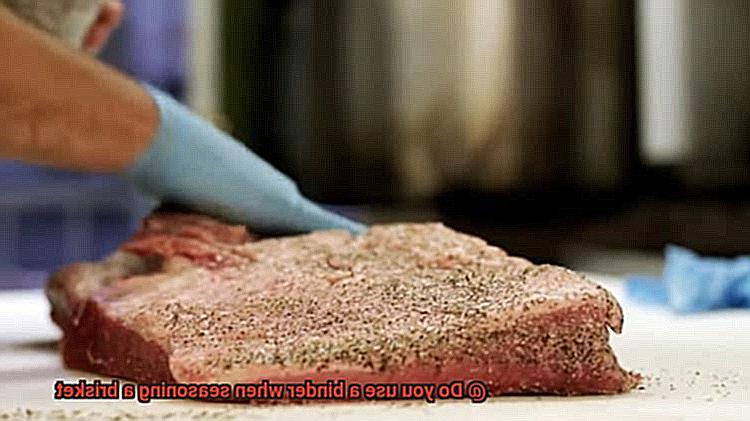
A binder is an ingredient or substance that acts as an adhesive agent between the meat and the seasonings. It ensures that the flavors stick to the surface of the brisket, enhancing flavor penetration and preventing seasonings from falling off during cooking.
Choosing the Right Binder:
When it comes to binders, there’s a world of possibilities. Here are some popular choices:
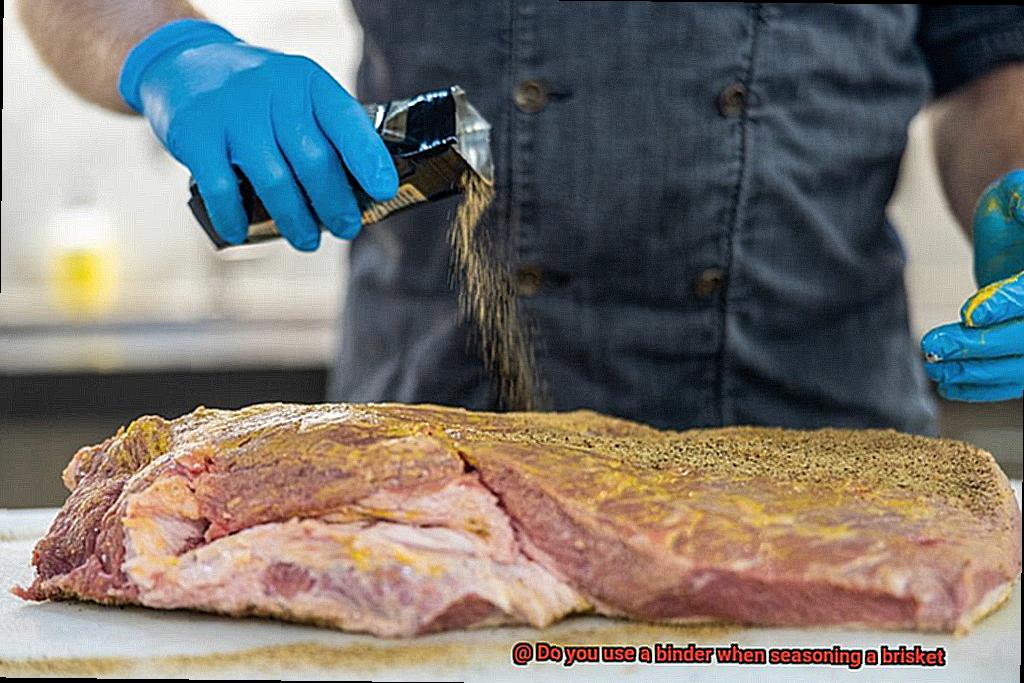
- Mustard: Tangy and versatile, mustard complements various spice blends. Its neutral base allows the rub to stick evenly to the brisket, while adding a subtle tanginess.
- Worcestershire Sauce: Bursting with savory and tangy notes, Worcestershire sauce not only helps seasonings adhere but also adds depth of flavor to your brisket.
- Oil: Whether it’s olive oil or vegetable oil, common oils act as binders while contributing to moisture retention. They ensure a tender and succulent end product.
Benefits of Using Binders:
Using a binder when seasoning a brisket offers several advantages:
- Enhanced Flavor: Binders ensure even distribution of seasonings, intensifying the overall taste experience of your brisket.
- Moisture Retention: Binders act as a shield, preventing the meat from drying out during long cooking processes like smoking or slow-cooking.
- Tenderizing Properties: Some binders contain enzymes or acids that break down proteins, resulting in a more tender and melt-in-your-mouth texture.
Is Using a Binder Necessary?
While using a binder is not mandatory, it can significantly enhance the flavor and texture of your brisket. Many pitmasters have achieved delicious results without binders, relying on the meat’s natural moisture to adhere the rub. Ultimately, the choice of using a binder depends on personal preference and experimentation.
Mustard as a Binder for Brisket
Prepare yourself, because we’re about to reveal the secret weapon that will make your taste buds dance with joy – mustard as a binder for your mouthwatering brisket. Buckle up and let’s dive into the sticky world of mustard.
The Sticky Factor:
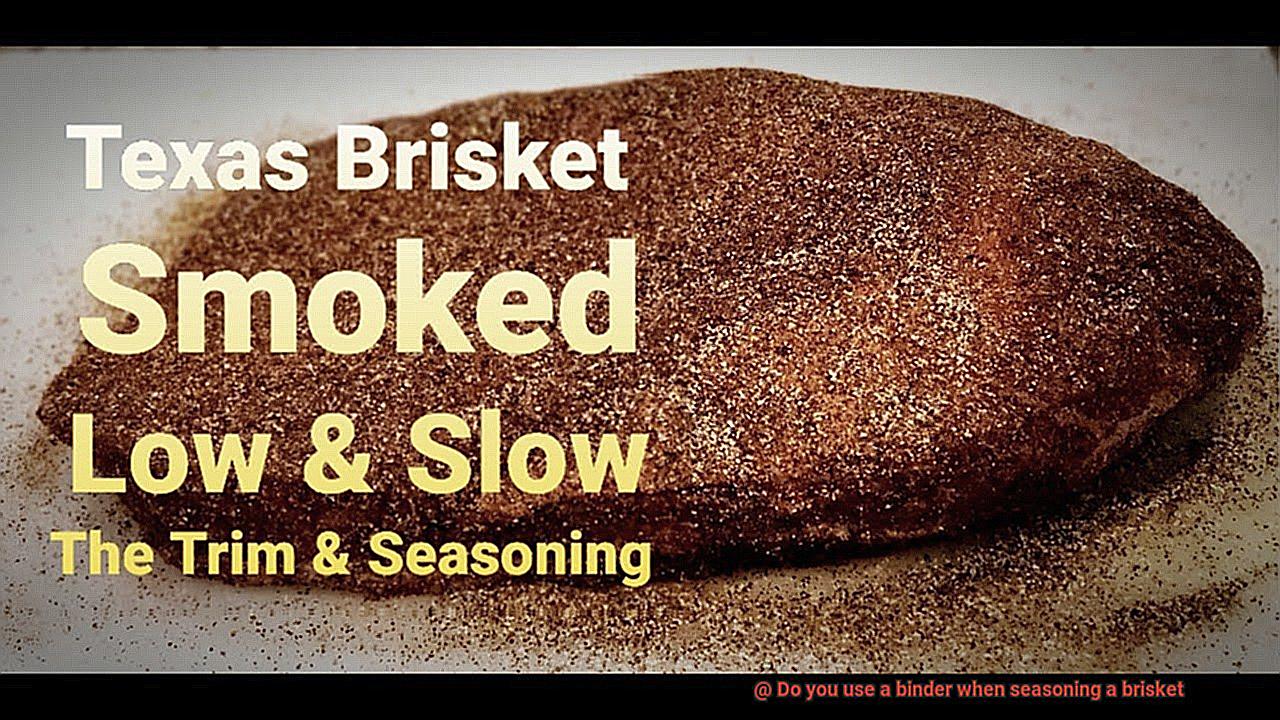
Mustard isn’t just an ordinary condiment; it’s sticky goodness in a bottle. Its natural stickiness acts like glue, allowing your seasoning to cling onto every nook and cranny of your brisket. No more worries about losing those precious flavors during cooking.
Flavor Harmony:
Why is mustard the go-to choice for many grill masters? It’s all about that flavor harmony. Mustard’s robust taste perfectly complements the smoky and savory notes of a juicy brisket. It’s like a match made in grilling heaven.
Quality Matters:
When selecting your mustard binder, opt for high-quality mustards without overpowering flavors or additives. You want the mustard to enhance the taste of your brisket, not overpower it. Choose a mustard that harmonizes with your preferred flavor profile.
Moisture Magic:
Not only does mustard help seasonings stick, but it also works wonders in keeping your brisket moist and tender. By creating a barrier on the surface, mustard traps moisture inside the meat during cooking, resulting in a juicy and flavorful end product that will have everyone coming back for seconds.
DIY Mustard Rubs:
For those adventurous grillers out there, why not experiment with homemade mustard rubs? Mix mustard with other spices and seasonings to create a unique flavor profile for your brisket. Take your taste buds on a wild ride with personalized blends that will leave everyone asking for your secret recipe.
Alternative Binders:
While mustard takes center stage as a brisket binder, it’s important to note that it’s not the only option. If mustard isn’t your thing, consider alternatives like olive oil, Worcestershire sauce, or even mayonnaise. The choice is yours, so pick what tickles your taste buds and complements your desired flavor profile.
Worcestershire Sauce as a Binder for Brisket
Well, get ready to unleash the secret weapon that will have your taste buds singing with joy: Worcestershire sauce. This versatile condiment isn’t just for adding a splash of flavor to your steak or burger; it can also work wonders as a binder for your brisket, creating a tantalizing crust and enhancing the overall taste of the meat.
But how does Worcestershire sauce wield its magic as a binder, you ask? It’s all about the remarkable blend of ingredients. Made from vinegar, molasses, anchovies, tamarind, and an array of spices, Worcestershire sauce infuses your brisket with complexity and richness. It acts as a culinary glue, effortlessly holding the spices and herbs in place, ensuring they won’t fall off or wash away during the cooking process.
Using Worcestershire sauce as a binder is a breeze. Simply brush or rub it evenly over the entire surface of your brisket before applying the dry rub or seasoning mix. This ensures that every bite bursts with flavor. And let’s talk about flavor – Worcestershire sauce delivers more than just adhesive powers. Its acidity tenderizes the meat by breaking down its fibers, resulting in a brisket that’s tender and juicy. Moreover, its natural umami flavors enhance the savory profile of the meat, imparting a subtle tanginess and depth that will have you reaching for seconds.
But hold on, there’s more. Some culinary maestros like to push the boundaries and concoct their own custom binders by mixing Worcestershire sauce with other ingredients such as mustard, soy sauce, or olive oil. These ingenious combinations take your brisket on an unforgettable journey to flavor-town, adding their own unique twist.
Now, I must confess that Worcestershire sauce might not be everyone’s cup of tea. Its robust flavor can overpower some palates. Fear not, my fellow grillmasters. There are alternative binders like mustard or olive oil that can work just as marvelously.
Do You Need to Use a Binder?
As pitmasters, we are constantly in pursuit of the perfect balance of flavors and textures in our smoked meats. In this article, we will explore the pros and cons of using a binder, empowering you to make an informed decision that aligns with your grilling style and taste preferences.
Pros of Using a Binder:
- Enhanced Flavor Distribution: A binder acts as a sticky canvas, allowing the seasonings to adhere evenly to the surface of the brisket. This ensures that each bite is bursting with flavor, tantalizing your taste buds from the first to the last mouthful.
- Crust Creation: The binder forms a beautiful crust on the outside of the brisket, adding texture and depth of flavor. This crispy exterior provides a delightful contrast to the tender, juicy interior, creating an unforgettable dining experience.
- Moisture Retention: Some pitmasters argue that using a binder helps retain moisture in the meat during the cooking process. This can result in a more succulent and juicy brisket, ensuring your guests go back for seconds.
Cons of Using a Binder:
- Interference with Natural Flavors: Opponents of using a binder argue that it can mask or interfere with the natural flavors of the meat. They prefer to let the simplicity and quality of the brisket shine through without any additional substances.
- Personal Preference: As with any culinary technique, the choice to use a binder ultimately boils down to personal preference. Some cooks may find that using a binder enhances their desired flavor profile, while others may prefer a more minimalist approach.
Experimentation is Key:
To determine whether you should use a binder when seasoning your brisket, I encourage you to embark on your own flavor adventure. Take the time to experiment with different binders such as mustard, olive oil, Worcestershire sauce, or even mayonnaise. Apply them generously to the surface of your brisket and observe the results. Let taste, texture, and personal preference guide your decision-making process.
Tips for Applying Rub to Brisket Without a Binder
In this article, we will explore expert tips on how to apply rub to brisket without the need for a binder. Whether you prefer a milder or more intense flavor, these tips will help you create a delicious and tender brisket that will impress your friends and family.
Tip 1: Dry the Meat for Maximum Flavor:
Before seasoning your brisket, ensure that it is as dry as the desert sands. Patting the meat with paper towels removes any lingering moisture, allowing the rub to adhere better. This crucial step sets the foundation for achieving a flavorful and crispy crust that will make your taste buds dance with delight.
Tip 2: Generously Apply the Rub, No Holding Back:
When it comes to seasoning your brisket, don’t be timid. Grab that rub with gusto and liberally apply it all over the meat. Be sure to cover every inch of the brisket’s surface, ensuring that each bite bursts with flavor. Gently press the rub into the nooks and crannies, creating a bond between spice and meat that will leave you craving more.
Tip 3: Embrace Coarse-Grain Rubs for Texture and Depth:
For an extra punch of flavor and texture, consider using a coarse-grain rub on your brisket. The larger grains provide a delightful crunch that complements the tender meat, taking your taste buds on a journey of savory bliss. Allow these robust grains to add depth to the overall taste of your brisket, elevating it to new heights of deliciousness.
Tip 4: Let it Rest, Patience is Key:
After generously applying the rub, resist the urge to throw that brisket onto the grill immediately. Instead, let it rest at room temperature for about 30 minutes, allowing the flavors of the rub to penetrate the meat. This step ensures a more even and flavorful crust that will make your brisket the star of any barbecue gathering.
Tip 5: Monitor Temperature, Keep it Steady:
During the cooking process, keep a watchful eye on the temperature of your smoker or grill. Consistency is the name of the game to ensure that the rub adheres and cooks onto the brisket evenly. Avoid temperature fluctuations like a seasoned pitmaster, for they can disrupt the harmony of flavors and textures.
Tip 6: Allow for Resting Time, Patience Rewarded:
Once your perfectly cooked brisket is ready to be devoured, resist the temptation to slice it right away. Give in to patience and allow it to rest for at least 15 minutes. This resting period allows the juices to redistribute throughout the meat, resulting in a more tender and flavorful final product that will make your guests’ taste buds sing in delight.
Benefits of Using a Binder on Brisket
Look no further than the humble binder. A binder is a simple yet essential ingredient that can transform your brisket from ordinary to extraordinary. In this article, we will explore the benefits of using a binder on brisket and why it is worth incorporating into your barbecue repertoire.
Enhanced Flavor and Adhesion:
One of the primary benefits of using a binder on brisket is its ability to enhance the flavor profile. A binder, such as mustard or oil, acts as a sticky agent that helps the rub adhere to the meat. This ensures that every spice and seasoning sticks to the surface of the brisket, resulting in a more robust and flavorful crust. With a well-adhered rub, you’ll experience an explosion of flavors with every bite.
Improved Moisture Retention:
Nobody likes dry and tough brisket. Using a binder can help lock in moisture during the cooking process, resulting in a tender and juicy end product. The binder creates a barrier between the meat and the heat source, preventing excessive evaporation and retaining the natural juices within the meat. Say goodbye to dry brisket and hello to moist and succulent slices that melt in your mouth.
Even Seasoning Distribution:
Another advantage of using a binder is its ability to promote even seasoning distribution throughout the brisket. The sticky surface created by the binder allows the rub to adhere more evenly, ensuring that each bite is perfectly seasoned. No more bland spots or pockets of overpowering spices; every slice will be perfectly balanced and bursting with flavor.
Enhanced Bark Formation:
The bark, that coveted outer layer of caramelized goodness, is a hallmark of great barbecue. Using a binder can help create an exceptional bark on your brisket. The binder aids in the formation of a crisp and flavorful crust by ensuring that the rub stays in place and adheres to the meat during the cooking process. The result is a beautifully caramelized exterior that adds texture and depth of flavor to your brisket.
Easier Handling and Presentation:
Applying a binder before seasoning your brisket not only improves flavor but also makes the preparation process easier. The binder creates a sticky surface that helps the rub adhere, reducing the chances of it falling off or becoming unevenly distributed. This makes handling the brisket more manageable and minimizes messiness. Additionally, using a binder can enhance the appearance of your brisket, creating an attractive crust that adds visual appeal to your final product.
Disadvantages of Using a Binder on Brisket
Brisket, the undisputed king of BBQ, demands meticulous attention to detail and technique. While using a binder on brisket has its merits, it’s crucial to explore the flip side. In this article, we will delve into the disadvantages of using a binder on brisket, allowing you to make an informed decision for your next smoking session.
Flavor Alteration:
Using a binder like mustard or olive oil can inadvertently impart its own distinct taste onto the brisket. This alteration might not always complement the flavors of the seasoning and smoke, resulting in an unwanted flavor profile that may not appeal to everyone. Imagine investing hours into perfecting your rub and smoking technique, only to have it overshadowed by the overpowering taste of mustard or olive oil.
Barrier to Smoke Penetration:
By applying a binder, you create an unintended barrier between the meat and the smoke. This obstruction hampers the full penetration of smoky flavors into the brisket, compromising that sought-after taste that barbecue enthusiasts crave. Imagine biting into a slice of brisket, expecting a symphony of smoky goodness, only to be met with a mere whisper of flavor.
Texture Compromise:
One of the joys of brisket lies in its irresistible crispy bark. Unfortunately, using a binder can interfere with the formation of this desired texture. The layer created by the binder prevents the bark from developing adequately, resulting in a softer and less satisfying texture. Picture sinking your teeth into a slab of brisket, hoping for that satisfying crunch, only to be met with a disappointingly limp bite.
Moisture Retention:
A binder adds moisture to the surface of the brisket, which can hinder the development of a good bark. The excess moisture from the binder makes it harder for the surface to dry out and achieve that coveted crust. Imagine laboring over your brisket, carefully monitoring the temperature and moisture levels, only to be left with a lackluster bark due to the excess moisture introduced by the binder.
Additional Time and Effort:
Using a binder adds an extra step to the seasoning process, requiring more time and effort. This additional step may deter those who prefer a simpler approach or are short on time. Imagine having limited hours before your barbecue event, scrambling to prepare the brisket, only to realize that you have added an extra layer of complexity to an already intricate process.
e1T-KBh0F9g” >
Conclusion
In conclusion, the use of a binder when seasoning a brisket can truly transform your barbecue experience. A binder acts as a culinary glue, ensuring that every flavorful ingredient sticks to the surface of the brisket, resulting in enhanced flavor penetration and an explosion of taste.
Popular binders such as mustard, Worcestershire sauce, and oil are game-changers in their own right. Mustard brings its sticky factor and harmonizes perfectly with the robust flavors of brisket. Meanwhile, Worcestershire sauce adds complexity and richness to elevate your taste buds to new heights. And let’s not forget about oil – whether it’s the smoothness of olive oil or the versatility of vegetable oil, it plays a crucial role in retaining moisture and guaranteeing a tender end product.
The advantages of using a binder are simply mouthwatering. It ensures that every bite is bursting with flavor, creates a beautiful crust that will make your guests’ jaws drop, locks in moisture during cooking for succulent results, guarantees even seasoning distribution for consistent taste throughout, and makes handling and presentation effortless.
However, it’s important to consider some potential drawbacks when using a binder. It may slightly alter the flavor profile of your brisket – but hey, experimentation is part of the fun. Additionally, it could create a barrier that hinders smoke penetration and compromise texture by interfering with bark formation. And while binders excel at retaining moisture overall, there’s always a slight chance they could affect it negatively.
Ultimately, the decision to use a binder when seasoning your brisket boils down to personal preference and adventurous spirit. As a pitmaster extraordinaire, you owe it to yourself to explore different binders and techniques until you find the perfect match for your desired flavor profile and unique cooking style.

